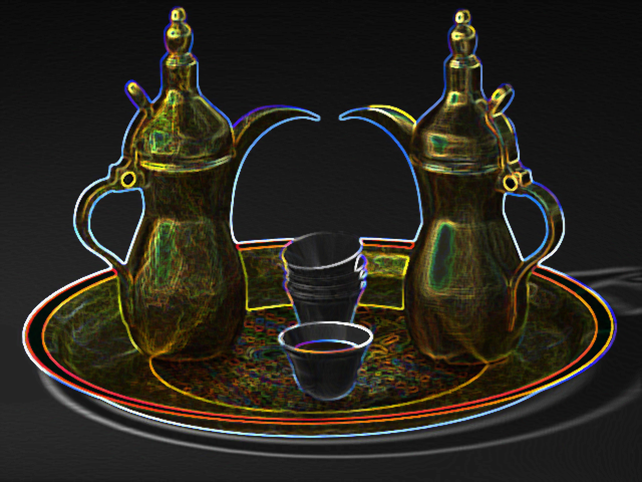Some weeks ago I found a copy of “Saudi Customs and Etiquette” at one of the Jarir Bookstore branches in al-Khobar. The book was written by Kathy Cuddihy, based on her experience from many years of living in Saudi Arabia. The book is well researched and includes a useful and fairly comprehensive glossary of cultural terminology on the back pages. This is a book that I should have read before boarding the plane last November when I first moved here. The book covers such topics as the tradition of hospitality, bargaining, conducting business, Islam, laws, the Islamic calendar, as well as a useful list of do’s and don’ts. In the first chapter, Hospitality, she covers a very important custom: the traditional coffee ritual. This chapter contains some very interesting information for coffee lovers. Wild coffee plants were first cultivated in Arabia (Yemen) in the 15th century, although the benefits and uses of coffee beans were discovered much earlier; probably in the ninth century. The Arabica coffee bean gets its name from the fact that it was – and still is – cultivated in Arabia. It has become the most popular type of coffee bean around the world. Indeed, according to a recent report in Bloomberg Businessweek, Arabica coffee accounts for about 70 percent of the global coffee market. There are only two species of coffee: Arabica and Robusta. While most coffee sold at coffee shops is of the Arabica variety, Robusta beans are often used for instant coffees and have a harsher flavor and contain more caffeine. My brother – a highly experienced chef who lives in London and who trained at a college for professional chefs in Westminster, central London, in the 1980s – is knowledgeable about food and nutrition. Several years ago he warned me not to drink instant coffee because it contains inferior ingredients than Arabica coffee, as well as the extra caffeine. The only instant coffee I drink these days is Starbucks’ brand instant coffee, which certainly tastes better than most instant coffee, so I hope it is a little healthier than most other brands. It looks like my brother had given me some good advice.
There are several distinct steps in traditional Arabian coffee making. First, green beans are roasted in a long-handled mahmasa. The roasting beans are stirred with another long-handled tool called a yad al-mahmasa. Next, after the beans start to glow, they are placed in a wooden box called a mubarrad to cool. Once the beans have cooled, they are ground in a mortar (nijr) made from wood, stone, or brass. Water is then placed in a dallah (traditional coffee pot with a rounded bottom and a long spout). The ground coffee is then added to the pot and the water is boiled on a stovetop or over a fire. Spices such as cardamom and saffron may be added to the water for additional flavor and health benefits – such as helping with digestion – and brought to the boil again. The coffee drink is then poured from the dallah with a theatrical flourish into small bowl-shaped cups, which do not have any handles. The cups are typically only half-filled so that the coffee will be drunk before it becomes cold. The server – whether in a traditional Arabian coffee house or a private home – will add more coffee to the cup when it is nearly empty, which ensures that the coffee stays hot. I was rather surprised to read that traditionally the coffee is drunk without sugar because most Saudis seem to like sweet coffee. So I’m not sure how accurate that is. In a social setting, Cuddihy states that guests should drink no more than three cups of coffee and, if offered coffee by the host, should drink at least one cup to acknowledge the host’s hospitality. I suspect that these rules apply only to situations where the host and guest do not know each other very well. I’m sure that if the coffee drinkers are good friends, there will be few limits on the number of cups that can be drunk! I have not experienced these Arabian coffee traditions first hand yet, but it is something that I am looking forward to. I have been asking around about places where I might be able to drink traditional coffee and have been given the suggestion of Café Liwan on the corniche in al-Khobar. So that will probably be the subject of a future article.

No comments yet.